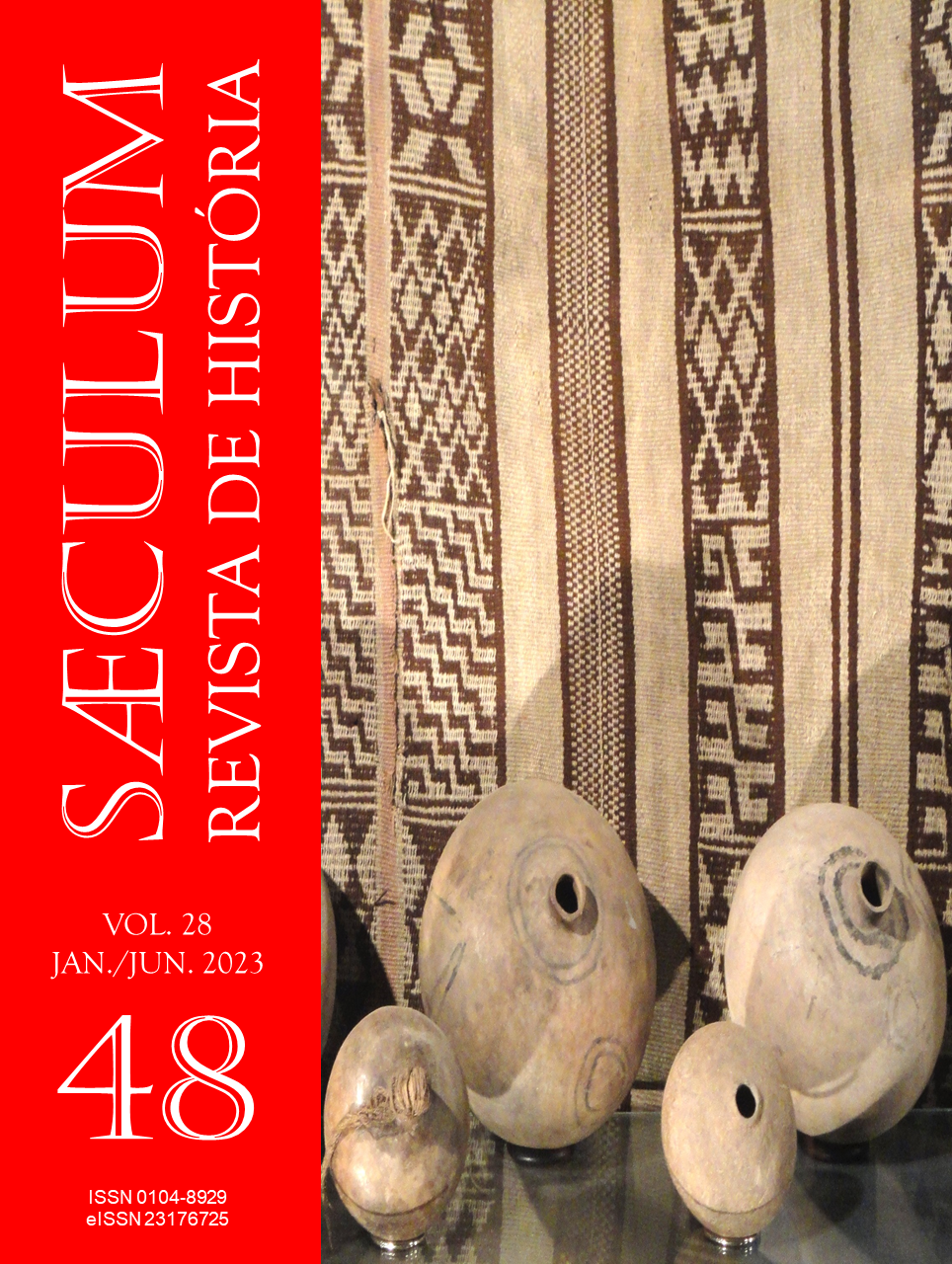Sud chesti
Soviet science under the scrutiny of the regime
DOI:
https://doi.org/10.22478/ufpb.2317-6725.2023v28n48.65620Keywords:
Cinema, Science, Soviet Union, Late StalinismAbstract
The film Sud chesti [Court of honor], 1948, by director Abram Room, was one of the elements of the Soviet regime's media campaign to put the genie back in the bottle after the cultural opening to the allies and the social relaxation during and immediately after the Second war. It was necessary to justify to the country the turnaround in the international situation with the Cold War, the severing of ties with former allies, the containment of industrial espionage promoted by them against the USSR, the subjection of science to political dictates and the repression of defenders of reform, rapprochement and distension. For his analysis, Marc Ferro's cinematographic socio-history was used, with his search for the intertwining of politics, society and cinema, with the intention of allowing cinema to present society and politics from another perspective, and these, when modeling cinema and be influenced by it. Parts of the audience identified with the regime and its new exacerbated post-war nationalism found in Sud chesti the elements for identifying and persecuting internal enemies, how to direct them to the reborn court of honor, and to understand its role in the political education of the masses. The defense of the homeland is involved with the objective of controlling scientific knowledge and its contacts with the outside world.
Downloads
References
BO, João Lanari. Cinema para russos, cinema para soviéticos. Rio de Janeiro: Bazar do Tempo, 2019.
BOOBBYER, Philip. The Stalin Era. Londres: Routledge, 2000.
BROWN, Archie. Ascensão e queda do comunismo. Rio de Janeiro: Record, 2010.
BRZEZINSKI, Zbigniew. Ideologia e poder na política soviética. Rio de Janeiro: GRD, 1963.
DEJONG-LAMBERT, William. The Cold War politics of genetic research: an introduction to the Lysenko Affair. Nova York: Springer, 2012. DOI: https://doi.org/10.1007/978-94-007-2840-0
DEUTSCHER, Isaac. Stalin. Rio de Janeiro: Civilização Brasileira, 2006.
FERNANDES, Luís. O enigma do socialismo real. Rio de Janeiro: Mauad, 2000.
FERRO, Marc. Cinema e História. São Paulo: Paz e Terra, 1992.
FERRO, Marc. El cine, una vision de la Historia. Akal: Madrid, 2008.
FERRO, Marc. O filme: uma contra-análise da sociedade? In LE GOFF, Jacques; NORA, Pierre. História: novos objetos. Rio de Janeiro: Francisco Alves, 1976.
FIGES, Orlando. Sussurros: a vida privada na Rússia de Stalin. Rio de Janeiro: Record, 2010.
FIGES, Orlando. Uma história cultural da Rússia. Rio de Janeiro: Record, 2017.
FITZPATRICK, Sheila. Everyday Stalinism: ordinary life in extraordinary times. Nova York: Oxford University Press, 1999. DOI: https://doi.org/10.1093/oso/9780195050004.001.0001
FÜRST, Juliane (org.). Late Stalinist Russia: society between reconstruction and reinvention. Londres: Routledge, 2006. DOI: https://doi.org/10.4324/9780203969687
FÜRST, Juliane. Stalin’s last generation. Oxford: Oxford University Press, 2010. DOI: https://doi.org/10.1093/acprof:oso/9780199575060.001.0001
GORLIZKI, Yoram; KHLEVNIUK, Oleg. Cold peace: Stalin and the Soviet ruling circle, 1945–1953. Nova York: Oxford University Press, 2004. DOI: https://doi.org/10.1093/acprof:oso/9780195165814.001.0001
HASTEDT, Glenn. Spies, wiretaps, and secret operations. Santa Barbara: ABC-CLIO, 2011. DOI: https://doi.org/10.5040/9798216017486
HOBSBAWM, Eric (org.). História do Marxismo. 3: O Marxismo na época da Terceira Internacional. Rio de Janeiro: Paz e Terra, 1987.
JORAVSKY, David. The Lysenko affair. Chicago: University of Chicago Press, 2010.
JUVILER, Peter. Freedom's Ordeal: the struggle for human rights and democracy in post-Soviet States. Philadelphia: University of Pennsylvania Press, 1998. DOI: https://doi.org/10.9783/9780812202397
KALIC, Sean. Spies. Santa Barbara: ABC-CLIO, 2019.
KOJEVNIKOV, Alexei. Stalin's great Science: the times and adventures of Soviet physicists. Londres: Imperial College Press, 2004. DOI: https://doi.org/10.1142/p307
LABARRÉRE, André Z. Atlas del cine. Madrid: AKAL, 2009.
LAWTON, Anna. Red screen: politics, society, art in Soviet Cinema. Londres: Routledge, 1992.
LEWIN, Moshe. O fenômeno Gorbachev. Rio de Janeiro: Paz e Terra, 1988.
LEWIN, Moshe. O século soviético. Rio de Janeiro: Record, 2007.
MEDVEDEV, Roy. Let history judge: the origins and consequences of Stalinism. Nova York: Columbia University Press, 1989.
MEDVEDEV, Zhores; MEDVEDEV, Roy. Um Stalin desconhecido. Record: Rio de Janeiro, 2006.
MEHNERT, Klaus. O Homem Soviético. São Paulo: Boa Leitura, 1966.
MILLER, Jamie. Soviet cinema: politics and persuasion under Stalin. Nova York: I.B. Tauris, 2010. DOI: https://doi.org/10.5040/9780755697557
MONTEFIORE, Simon. Stálin: a corte do czar vermelho. São Paulo: Companhia das Letras, 2006.
OVERY, Richard J. Os ditadores. Rio de Janeiro: José Olympio, 2009.
ROLLBERG, Peter. Historical dictionary of Russian and Soviet cinema. Lanham: Scarecrow Press, 2009.
RUBENSTEIN, Joshua; NAUMOV, Vladimir. Stalin's secret Pogrom. New Haven: Yale University Press, 2001.
SAKHAROV, Andrei. Meu país e o mundo. Rio de Janeiro: Nova Fronteira, 1976.
SEGRILLO, Angelo. Europa ou Ásia? A questão da identidade russa nos debates entre ocidentalistas, eslavófilos e eurasianistas. Tese de Livre-docência. USP. São Paulo, 2016.
SIBLEY, Katherine. Red spies in America. Lawrence: University Press of Kansas, 2004.
SUNY, Ronald. The Cambridge History of Russia, vol. 3. Cambridge: Cambridge University Press, 2006. DOI: https://doi.org/10.1017/CHOL9780521811446
TUCKER, Spencer (org.). The Cold War: the definitive encyclopedia and document collection. Santa Barbara: ABC-CLIO, 2020. DOI: https://doi.org/10.5040/9798216961857
VALIM, Alexandre Busko. Cinema e Guerra Fria: entre Hollywood e Moscou. In: TEIXEIRA DA SILVA, Francisco Carlos; LEÃO, Karl Shurster Sousa; LAPSKY, Igor (orgs.). O cinema vai à guerra. Rio de Janeiro: Campus, 2015, p. 179-191.
VOLKOGONOV, Dmitri. Stalin: triunfo e tragédia. Rio de Janeiro: Nova Fronteira, 2004, 2 vols.
Fontes
SUD chesti [Tribunal de honra]. Direção: Abram Room. Moscou: Mosfilm, 1948. 1 DVD (90 min), P&B.
Downloads
Published
How to Cite
Issue
Section
License
Copyright (c) 2023 Moisés Wagner Franciscon

This work is licensed under a Creative Commons Attribution-NonCommercial 4.0 International License.
A revista Sæculum permite aos autores a manutenção dos direitos autorais pelo seu trabalho, no entanto eles devem repassar direitos de primeira publicação ao periódico.











